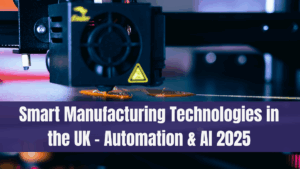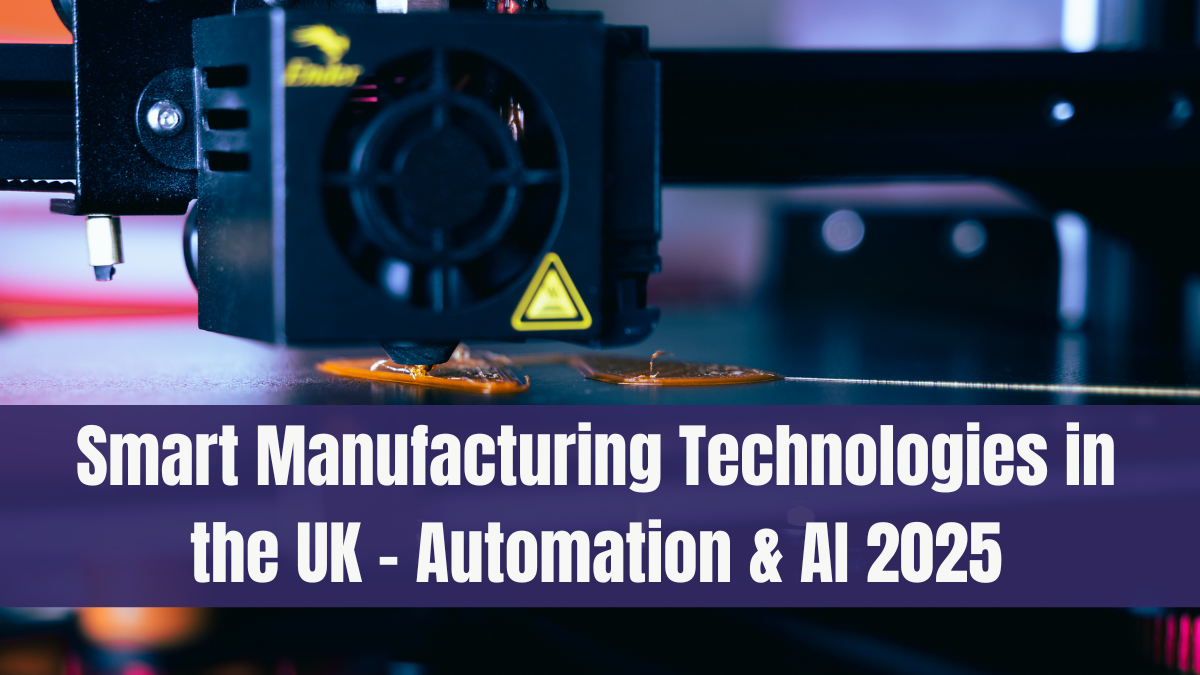The industrial landscape of the UK is undergoing a technological revolution in 2025, driven by smart automation, robotics, and artificial intelligence. With Industry 4.0 at full throttle, UK Smart Manufacturing Technologies 2025 are redefining how factories operate—enhancing productivity, precision, and sustainability. This new era of manufacturing promises a future where machines think, learn, and adapt in real-time.

Smart Factories Powering UK Industry
UK manufacturing is embracing smart factories—highly digitized setups where machines, sensors, and systems interact seamlessly. These smart environments are enabled by Industrial Internet of Things (IIoT) networks, which allow real-time monitoring, predictive maintenance, and flexible production lines.
-
Sensors track machine health and output
-
Cloud platforms analyze data for performance optimization
-
Automated systems adjust workflows without human intervention
From automotive plants in Birmingham to electronics units in Manchester, these technologies are driving faster, leaner, and more intelligent production.
Robotics Leading the Automation Frontier
One of the key drivers of UK Smart Manufacturing Technologies 2025 is advanced robotics. Robots now handle tasks ranging from high-precision welding to material handling with minimal error rates. Collaborative robots (cobots) work safely alongside humans, reducing fatigue and increasing output.
UK-based companies like Ocado and Rolls-Royce are integrating robotics into supply chains, proving that automation isn’t just about speed—it’s also about adaptability and safety.
Artificial Intelligence in Real-Time Decision-Making
AI plays a pivotal role in turning data into action. Machine learning algorithms now monitor production flows, predict failures, and recommend changes in real-time. This AI-led approach has allowed UK manufacturers to cut downtime by up to 30% in 2025.
For instance, AI tools in pharmaceutical plants adjust chemical processes to meet purity targets, while AI-powered vision systems detect microscopic defects on production lines in textile and electronics sectors.
Digital Twins and Virtual Simulation
Another cutting-edge trend in UK Smart Manufacturing Technologies 2025 is the use of digital twins—virtual replicas of physical assets. These are used for:
-
Simulating new product designs
-
Testing factory layouts before implementation
-
Predicting performance under various conditions
Aerospace and defense manufacturers are adopting this approach to reduce trial-and-error costs and ensure first-time-right outcomes.
Government Incentives Boosting Smart Tech Adoption
To accelerate the shift, the UK government is providing tax incentives, R&D grants, and digital transformation funds under its Industrial Strategy. Schemes like “Made Smarter” offer technical support and training to SMEs across regions like Greater Manchester and the North East.
This has led to a significant rise in smart tech adoption, particularly among traditional manufacturers looking to modernize and stay competitive in a global market.
Challenges in Workforce and Integration
While the benefits are substantial, manufacturers face hurdles in workforce readiness and system integration. Upskilling employees to work with AI and robotics is critical. The government and private sector are addressing this through apprenticeships, online training, and partnerships with technical institutes.
Seamless integration of legacy systems with smart solutions also remains a challenge, but modular software and cloud-native platforms are helping bridge this gap.
FAQs
What are smart manufacturing technologies?
Smart manufacturing technologies refer to the integration of advanced tools like AI, robotics, and IoT in manufacturing processes to enhance automation, efficiency, and data-driven decision-making.
How is AI used in UK manufacturing in 2025?
AI is used for predictive maintenance, quality control, real-time decision-making, and automating routine tasks across various manufacturing sectors in the UK.
What industries in the UK are leading in smart manufacturing?
Automotive, aerospace, pharmaceuticals, and food processing industries are leading the adoption of UK Smart Manufacturing Technologies 2025.
Are there any government programs supporting this shift?
Yes, programs like “Made Smarter” and R&D tax credits support manufacturers in adopting smart technologies, especially in SMEs.
What is a digital twin in manufacturing?
A digital twin is a virtual model of a physical object or system used to simulate, monitor, and optimize performance in real time.
Click here to know more.
